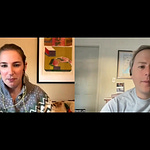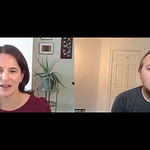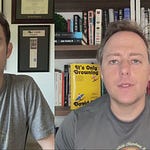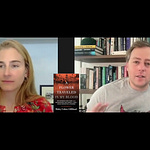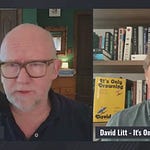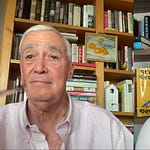Hi everyone - bit of a programming note here at Word Salad. The Contrarian excerpt will run on Thursday instead of today. So I decided to move some things around and post this fascinating conversation I had with a writer and thinker I deeply admire, The Atlantic’s Tom Nichols.
Because I don’t want to only be writing about It’s Only Drowning, even on publication day, I’ve structured these conversations so they’re really about the book’s broader themes. This one is about expertise - a subject Tom literally wrote the book on.
(Technically his book is The Death of Expertise, but you get the idea.)
It’s not an issue Tom and and I see eye-to-eye on, at least not perfectly, and that’s part of what I think made the conversation so interesting. What follows is a transcript of edited for flow and clarity. But consider listening to the whole thing for some of Tom’s insights I had to cut from the transcript for length.
In the meantime:
Here’s an essay adapted from the book I wrote for TIME asking, “Is It Wrong to Have Fun in a World That’s On Fire?” that came out today.
Here’s an excerpt that ran in Men’s Health.
Okay, here’s the transcript - I think you’ll find the conversation as interesting as I did!
DAVID
Hi, everybody. I’m here with Tom Nichols. Why don’t you quickly introduce yourself?
TOM
Thanks for having me. I’m a staff writer at The Atlantic, and I’m professor emeritus at the U.S. Naval War college, where I’ve taught for 25 years. I’ve worked in D.C. on the Hill, and I was on Jeopardy!, where I won some money. That’s the one thing people always find fascinating.
DAVID
I’m going to ask the question everybody asks, which is, what was the Final Jeopardy answer, and what was the question?
TOM
The question that pulled my chestnuts out of the fire was when I was losing my third game, and I went into it in third place. I was up against two really smart people, but they both tanked during the question. It was an odd question: “British actress Laura Keene first came to America in the 1850s and was later better known for her starring role in this play.”
People are thinking, “British actress,” “play,” and “mid-19th century.” But the category, U.S. history, was the tip off. Both of my opponents thought Uncle Tom’s Cabin. I managed to pull it out of my butt that it must have been the play Lincoln was watching when he was shot. The title of the play was Our American Cousin.
I lived to fight another day. I won five back when they retired you after five days — it’s not like the system today where you just keep going.
DAVID
I wanted to talk to you about this central question of expertise in American life and society more broadly because you wrote The Death of Expertise.
What I realized while writing It’s Only Drowning, is that while it’s the story of my brother-in-law and me surfing together, much of the book came back to the question, “Do you trust experts, or do you trust yourself and non-experts?” It started in the pandemic when I got vaccinated and my brother-in-law, Matt, did not.
TOM
The first time it occurred to me was in the late 1980s, but I'll come back to that.
I wanted to first add a personal anecdote like yours. One of my childhood friends back in my hometown existed on a steady diet of Fox News, and she absolutely refused to get vaccinated. I saw her during the pandemic, and I pleaded with her to get vaccinated because it was very dangerous. She had some serious comorbidities, and she just wouldn’t get vaccinated. She contracted Covid, and she was dead in a few days. I still feel pretty raw about that. The people who really propagandized anti-vaccines really hurt a lot of people.
To answer your question, “Where does this death of expertise come from?” Look, part of American culture is very egalitarian — “I’m as good as you.” That’s not true. What democracy really means is that I am legally and politically equal to you before the eyes of the law and in our electoral system.
Americans really take this further because we have this self-sufficient, frontier mentality: “I can log my own lumber, build my own house.” We have this strong egalitarian streak that says, “You're not the boss of me. You can't tell me what to do.” Back then, people were scared. What they were really saying was, “I’m scared. Here's what I wish people would do.” What started to change in the late 60s and early 70s was people no longer saying “I don’t trust experts” or, “I want to be equal and have my voice.” It was people saying, “I’m actually smarter than people who have been doing this thing for 30 years.”
It’s a luxury to say, “Nobody knows anything.”
DAVID
You were early to spot this trend. What made you write a book about it?
TOM
I think when I wrote The Death of Expertise, I was really writing about democracy. The first thing I ever wrote on the topic was a blog piece in 2013, long before Trump. I had been thinking of this for years. My expertise is in Russia; I speak Russian; I’ve been there a couple dozen times; and I’ve written books about it. Some kid on the internet said, “Tom” — he was trying to defend Ed Snowden — “I don’t think you really understand Russia. Let me explain Russia to you.” And I said, “No. No. I get paid to explain Russia to you. I am literally paid to do this.”
I wrote this long blog piece that became a viral article, and then Oxford called and asked me to turn the piece into a book. What I realized I was writing about was democracy and a growing trend of narcissism. An incredible narcissism that says, “I can never be wrong. I know everything. Anybody who tells me I'm wrong is telling me I'm stupid.”
The more charitable explanation for this that Richard Hofstadter wrote about in 1963 — that’s how far back this goes — is that the modern world is a busy, confusing, and scary place. People feel out of control. They respond and say, “I am not out of control. I am totally in control. I don't have to listen to experts. I can handle this on my own.” Hofstadter called it this myth of “omnicompetence.” People don’t want to feel out of control. People say, “No, I’m in charge. I know stuff.” It’s poisonous.
DAVID
A challenge writing It’s Only Drowning was making sure I made a distinction from the brother-in-law relationship working in the book and, “Tucker Carlson says potato and I say potahto, so let’s just call the whole argument off.” But at the same time, I can see when you talk about your friend on a very human level saying, “This is tragic. It’s not an unavoidable tragedy, but it’s still a tragedy.”
Let’s say you were an expert in the 80s paid to focus on your expertise, but your area of expertise is under attack. You don’t want to become a full-time defender of the concept of expertise, but you also don’t want people to turn on you. What would you advise an expert to do in this situation?
TOM
Two quick anecdotes. I had a crazy uncle. He’s loved me from the moment I was born. One day, he was ranting that everyone on the Hill and in Washington is corrupt. I said, “Mark, I work in Washington.” He said, “Then you’re corrupt too.” I looked at him and said, “Anyways, let’s have another beer.”
There is a kind of human empathy. You have to say to people, “Look, you know that’s not true. I know you’re upset about stuff, but who do you think works in Washington, in journalism? Who do you think teaches? They’re your sons and daughters, brothers and sisters, moms and uncles.” I think folks have become so far apart from each other. Elites look at the masses like this big grey ocean of the rabble. Most people look at the elites look at elites like the evil empire — if they were to take their academic robes off, they look like Darth Vader.
You’re asking me what I would do, and my answer is not comfortable. I gave a talk to a subcommittee in the National Academy of Sciences, and they asked this very question. I said, “I’m sorry. You’re just going to have to make people uncomfortable and angry. That’s part of the responsibility of expertise.” A lot of elites have withdrawn from American public life. They say, “I teach at Harvard, I don’t want to go on the road, do a podcast, talk to the public.” But I firmly believe that if you’re a doctor, a lawyer, a professor, or an engineer. Whatever it is, your client, at the end of the day, is society because you are granted a privileged position. You owe it to society to give that back and say, “Here I am. Ask the questions. Let’s have the discussions.”
When someone says, “I’m not really sure whether the world is really flat or whether we went to the moon,” academics, scholars, and experts have been trained to say, “I hear you. Let’s explore that together.” I talk about this in The Death of Expertise, this is a therapeutic model of education. But part of education is making students feel bad, uncomfortable, and think, “Maybe I don’t know stuff.” I want experts to say, “Listen, I will talk to you about a lot of things. But we’re going to start from the assumption that I know more about astrophysics than you do. You must accept the world is round before we move on to the next thing.”
The reaction to that has been, “Tom, people don’t want to be condescended to.” And I shot right back and said, “People also know when you’re patronizing them.”
DAVID
I think there’s nothing as condescending as saying, “I hear what you have to say, but I’m not even going to engage with you. If you were a peer, we could have a conversation. But I’m not capable of having a conversation with you. You’re too dumb to reason with.” That’s condescending.
TOM
David, I think that’s the problem. If someone says, “I want to talk to you about Russia,” we are not peers. It’s uncomfortable to say this to people. We are not peers. We are not starting from an equal level of knowledge. We are peers in the eyes of God.
DAVID
The last thing you said, maybe that’s actually really important. People want to feel seen. They want to feel that in the eyes of God, or in the eyes of the Constitution, you’re not better than me, and I’m not better than you. That doesn’t mean we know the same amount of astrophysics.
TOM
That’s the problem. They want to be seen about everything, at all times.
DAVID
If I’m talking about writing, speeches, or politics, I’m often the one that has the expertise.
For surfing, I’m a total novice with no aptitude. When I was trying to learning something new, the number of internet gurus who I went through and then only over time realized, “They don’t know what the fuck they’re talking about. They just have huge audiences.” That was really eye-opening to me.
It gives me sympathy for people who don’t know where to start. People look for experts online, but they don’t know the difference between a good expert and a bad expert. So they ask, “Who’s charismatic, and who has a lot of followers?” Being charismatic with a lot of followers and being an expert are not correlated – but they seem correlated.
TOM
I inveigh against this in The Death of Expertise. When people say, “I saw on Facebook…” , I go, “Well, there’s your problem [Facebook].” When students ask me, “Well, what can I trust?” I start with very simple things. If you’re reading a source, does it have a corrections page? Does it have an editor?
Substack reached out to me many years ago when they were starting. I said, “Look, I’m just not good enough to work without an editor and fact-checkers..” I have a couple of big pieces coming out in print edition this summer, and it was torture in the good way because my editors and fact-checkers pulled me up short. “Do you know this for a fact? Can you prove this? Is this a reasonable assertion?”
This narcissism problem comes down to: people don’t go to the internet for information, they go there for confirmation. They start from their belief and plow through the internet until they find someone who tells them what they already thought. There’s something I feel from you and in your writing — there’s almost an imbalance of empathy. People go, “See, well, you’re [David] in a privileged position, and so you have to understand them more than they understand you.” That always rankles me.
DAVID
As you said, there’s the idea that privileged people owe it to be more empathetic. I think people who say that are well-intentioned but incorrect.
It’s less so saying that I have higher responsibility and more so saying I’m a curious person. I’d rather be somebody who knows what makes others tick than not, so I should just live like that whether or not I change people’s minds. That’s a cultural value of mine.
TOM
I’m going to push back on you in the way I do many people whom I’ve talked to about this. People say, “Tom, you have intellectual curiosity as a value. You’ve traveled.”
In the late 70s, I was in a dying mill town with stagflation and crumbling factories. My mother, who loved me more than anything in the world, said to me when I was going off to college, “Leave this town and don’t come back.” For some of the people I went to school with, that idea was terrifying. They were never going to leave. As things changed around them, they became angry.
If we are really to treat our fellow citizens as equals, peers, morally-conscious, independent people who have as much of an obligation to citizenship as we do, we have an obligation to say, “You’re right. I’ve never lived in Mississippi. You've never lived in Springfield, Massachusetts.” Why is it my obligation to understand where you’re from greater than it is on you to understand where other people live?
A friend from the rural south and I were talking, and he said, “Look, you have to reach out to them because they feel like they’re on the downside of a national evolutionary curve, and they resent it.” And I said, “No. That is not an answer. That is not citizenship, that’s receivership.”
DAVID
I think what you’re saying is we have a shared obligation. We’re citizens, and we have an obligation to figure out just how to live with each other. The question is, at a moment where a lot of our fellow citizens are not living up to that obligation, what do we do?
TOM
We’re really arguing about empathy versus tough love. I’m a firm believer in tough love. The Democratic party has been captured institutionally by young, college educated people who often talk to the rest of America like they’re regurgitating some graduate gender studies seminar. It drives me crazy. Until Trump, I was a moderate New England Republican. Part of the reason I wasn’t a Democrat was because of that supercilious lecturing, hectoring Democratic approach.
I think the answer lies not in more empathy but in saying, “I respect you, I hear you. But you’re going to have to hear and respect me. That’s part of the deal.” Maybe we just don’t spend enough time together. The sorting of America has pushed us so far apart.
This whole argument about the way people relate to experts reminds me of my father. My father was a racist. He was born in 1918. To him, black people were inferior, unless those black people were Barack Obama or the guy he worked with at the factory. The reason my father found it easy to hate black people was he didn’t know any of them.
It’s the same problem now. One more true story: my brother, a retired cop, owned a bar. I was teaching at Dartmouth at the time. Guy at the bar tells my brother, “You’re brother’s a professor, huh?” My brother went, “Yeah.” He went, “Seems like a good guy anyway.”
DAVID
I would say we’re both right, and we don’t actually disagree. I think we’re both saying that empathy creates the space for tough love. What you’re saying is tough love works better with people you spend time with. I think that’s a perfect place to end because I can think It’s Only Drowning is a story that illustrates the point I believe we agree on.
TOM
I’ll pile on the agreement. The place we really agree is where empathy brings you: the willingness to talk to someone in a very direct and tough way. What’s worrying me, and I see this in myself, is that we have reached the point where some folks we just don't engage anymore. Despite the fact my mother used to say, “You’d argue with a statue”
I have reached the point where people say, “Filthy immigrants are bringing tuberculosis, the world might be flat, and we didn't really go to the moon.” I just go [shrugs] “Okay, whatever. Fine.” I have lost my empathy. When someone says, “I’m not going to get vaccinated,” I go, “As long as you don’t live in my neighborhood.” That’s bad, not only as a citizen, but I’m failing as a Christian. I’m trying not to be that way.
Empathy gets us back to saying, “I’m going to engage, but it has to be on certain terms — you’re going to respect me, as I do you.” When you can do that to other people, it shows you care.
DAVID
Thanks for taking the time. And in addition to It’s Only Drowning, you should read Tom’s first book, The Death of Expertise, and his second book, Our Own Worst Enemy.
TOM
Thanks for having me.



